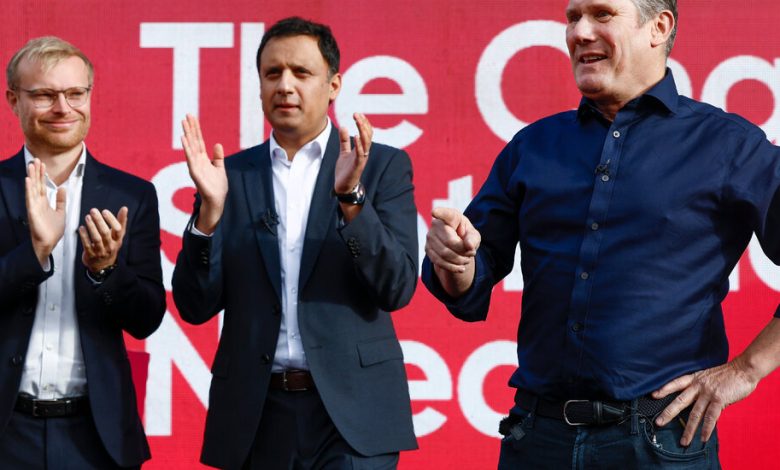Best Time to Hold a Political Conference? Right After Your Party Wins Big.

Only a month ago, some Labour Party officials were fretting about the risks of fighting a parliamentary election in Scotland days before the party’s annual conference.
What if the party underperformed, just before its leader, Keir Starmer, had to make one of the most important speeches of his career?
In the end, the opposite happened.
Labour exceeded its own expectations, trouncing the Scottish National Party in the district of Rutherglen and Hamilton West, outside Glasgow.
It now seems the timing could not have been better. The victory not only promised to energize the gathering in Liverpool, but it also offered a road map for how Britain’s main opposition party could defeat the Conservatives and regain power after 13 years.
“One thing is now clear,” Labour’s triumphant candidate, Michael Shanks, said to a cheering crowd on Friday. “There’s no part of this country where Labour can’t win. Labour can kick the Tories out of Downing Street next year and deliver the change that people want and this country so badly needs.”
That is a message that Labour’s leaders will push relentlessly over the next three days, and it captures a paradox at the heart of British politics: Labour, the party of change, is seeking to lock in its current trajectory, while the Conservatives, the incumbents lagging in the polls, are desperate to shake up the political landscape.
That dynamic helps explain why the Conservative leader, Prime Minister Rishi Sunak, scrapped part of a costly high-speed rail project — one long supported by both parties — and is restyling himself as a disrupter. “Be in no doubt,” he told his party conference last week in Manchester, “it is time for a change, and we are it.”
For Mr. Starmer, the goal is less far-fetched, if still challenging, according to analysts: He needs to give voters good reasons to vote for his party, rather than simply against the unpopular Conservatives.
“Keir Starmer has done a lot of things faster than he expected,” said Jonathan Powell, who served as chief of staff to a previous Labour prime minister, Tony Blair. “His task now is to make the sale to the public, which doesn’t really know him.”
That will most likely involve Mr. Starmer reiterating the five missions that he set for the party in February, focused on economic growth, clean energy, the National Health Service, crime reduction and expansion of opportunity.
A few of these missions sound not unlike the goals Mr. Sunak has set. And if Labour wins power, it will face the same funding squeeze that has shackled the Conservatives. But Mr. Starmer at least is not hobbled by his party’s record in government. Polls suggest that serial scandals under one of Mr. Sunak’s predecessors, Boris Johnson, and the misbegotten tax policies of another, Liz Truss, have lingered in voters’ minds.
“People don’t like the Tories — they’re prepared to vote for Labour,” said Steven Fielding, an emeritus professor of political history at the University of Nottingham, who is attending the conference as a delegate. “But there is a sense that Labour has to give those voters something.”
One thing Labour does not want to give them is the drama that spiced up the Conservative conference, with its attention-grabbing speeches by Ms. Truss and Suella Braverman, the home secretary, both of whom appeared to be vying for the future of the party even as Mr. Sunak tried to assert his control.
At a pre-conference briefing for delegates, Mr. Fielding said, Labour officials warned them to avoid unguarded late-night conversations with journalists. “This is not a place to debate policy,” he said, paraphrasing the party’s message. “This is not a time for disagreement. This is a time for nailing the lead Labour has.”
Mr. Starmer will no doubt gladly discuss the by-election. Labour won back the seat from the Scottish National Party, which had held it since 2019, with a resounding 58.6 percent of the vote, an increase of 24.1 percentage points over its last election, while the S.N.P. scored 27.6 percent, a decline of 16.6 points.
“You couldn’t have had better walk-up to the conference,” said Nicola McEwen, a professor of public policy at the University of Glasgow. “The scale of the victory is more than they could have hoped for.”
Professor McEwen cautioned that by-elections, with their low voter turnouts and strong anti-incumbent bias, do not automatically translate into similar gains in general elections. But she said the Labour Party had run an effective, disciplined campaign in Rutherglen — one it could rerun in districts across Scotland, where the S.N.P., like the Conservatives, is battling acute voter fatigue.
Were Labour to replicate its success throughout Scotland, it could pick up 42 seats, according to John Curtice, a professor and pollster at the University of Strathclyde. (It currently has only two.) That would restore the party to a level of dominance that it has not had since 2014, when the S.N.P., riding a wave of support for Scottish independence, emerged as a dominant political force.
Such a gain could help Labour amass a clear majority in Parliament, even if — as Professor Curtice said was likely — the party’s nearly 20-point advantage over the Tories tightens somewhat in the coming months.
If the S.N.P. maintained its current number of seats, Labour would need to beat the Tories by 12 percentage points just to eke out a single-seat majority in Westminster, according to Professor Curtice. But for every 12 seats that Labour wins in Scotland, it could give up two percentage points to the Tories and still gain a majority.
Labour still faces challenges, political analysts said. Mr. Starmer, a former public prosecutor, is not nearly as charismatic a figure as Mr. Blair was in 1997. In polls of whom Britons would prefer as prime minister, he ranks roughly even with Mr. Sunak, even though his party is far ahead of the Conservatives.
As prime minister, Mr. Sunak retains an ability to set the agenda. After Mr. Sunak announced the suspension of the rail project, called High Speed 2, Mr. Starmer acknowledged that Labour would have to honor it. “I can’t stand here and commit to reversing that decision,” Mr. Starmer told the BBC. “They’ve taken a wrecking ball to it.”
But on Friday, the Labour leader was not looking over his shoulder at the Tories. In a jubilant detour to Scotland, on his way to Liverpool, he sounded very much like a politician who could see a clear path to 10 Downing Street.
“You blew the doors off,” Mr. Starmer told a victory rally. “Because we’ve changed, we are now the party of the change here in Scotland. We’re the party of change in Britain, the party of change right across the whole country.”



